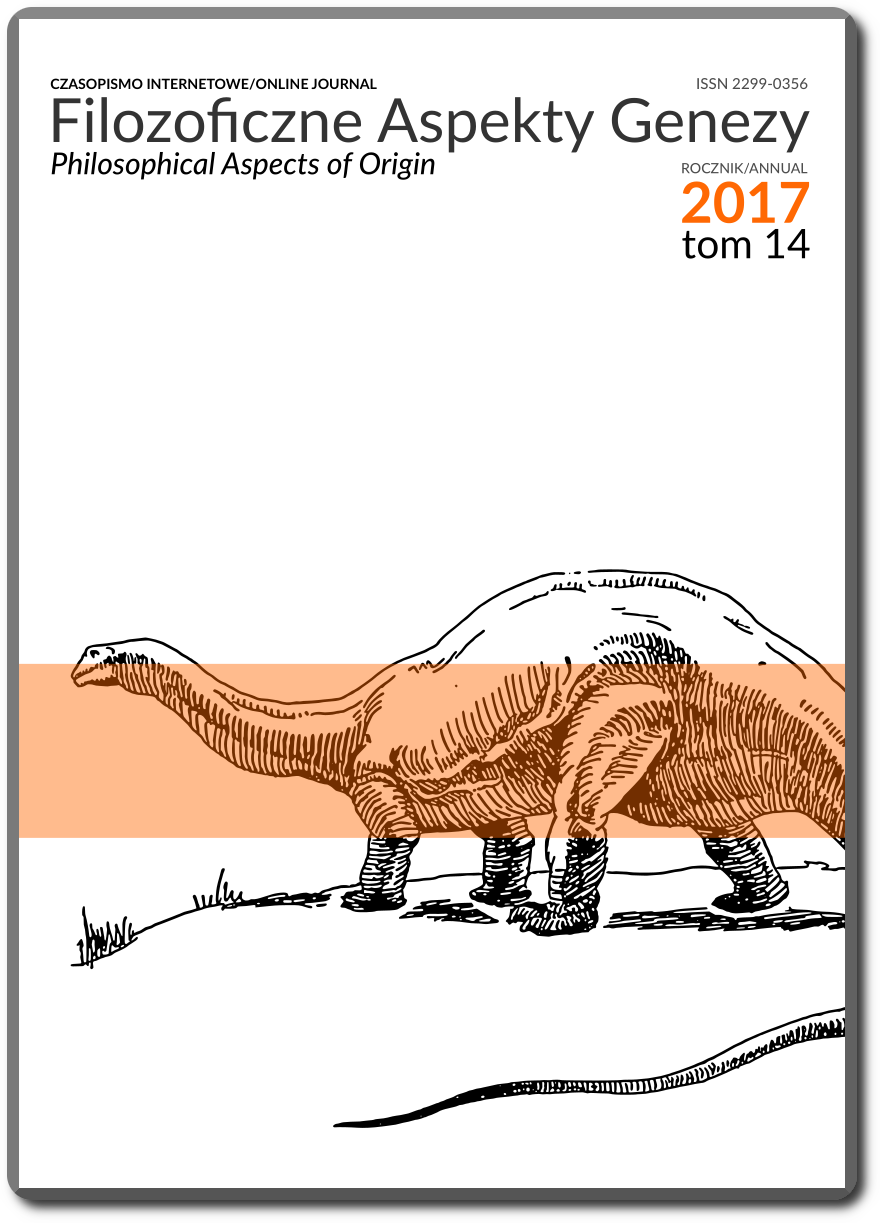Opublikowane 24.05.2021
Słowa kluczowe
- naturalizm metodologiczny,
- filozofia mechanistyczna,
- pozytywizm,
- pragmatyzm,
- niepojmowalność Boga
- teleologia,
- metodologiczny układ odniesienia ...More

Utwór dostępny jest na licencji Creative Commons Uznanie autorstwa 4.0 Międzynarodowe.
Jak cytować
Abstrakt
Podstawą naturalizmu metodologicznego, służącego wzmocnieniu ekskluzjonistycznego poglądu na badania naukowe, są trzy problematyczne nurty filozofii: filozofia mechanistyczna, pozytywistyczna epistemologia i doktryna niepojmowalności Boga. Każda z tych filozofii posiada wewnętrzne wady, przez które stanowiska te nie są w stanie objąć pełnego zakresu związków przyczynowych, jakie usiłuje badać nauka. Jednak pomimo tych problemów, omawiany tu rodzaj naturalizmu wykazuje, jako metodologia, pewne pozytywne cechy, które należałoby zachować, nawet jeżeli sam naturalizm metodologiczny jest nie do utrzymania.
Downloads
Bibliografia
- Barrett Justin L., Cognitive Science, Religion, and Theology: From Human Minds to Divine Minds, Templeton Press, West Conshohocken 2011.
- Bartlett Jonathan, „Describable But Not Predictable: Mathematical Modeling and Non-Naturalistic Causation”, w: Bartlett and Holloway (eds.), Naturalism and Its Alternatives in Scientific Methodologies…, s. 113-127.
- Bartlett Jonathan, „Introduction”, w: Bartlett, Halsmer, and Hall (eds.), Engineering and the Ultimate…, s. 1-8.
- Bartlett Jonathan, „Using Turing Oracles in Cognitive Models of Problem-Solving”, w: Bartlett, Halsmer, and Hall (eds.), Engineering and the Ultimate…, s. 99-122.
- Bartlett Jonathan, Halsmer Dominic, and Hall Mark (eds.), Engineering and the Ultimate: An Interdisciplinary Investigation of Order and Design in Nature and Craft, Blyth Institute Press, Broken Arrow, Oklahoma 2014.
- Bartlett Jonathan and Holloway Eric (eds.), Naturalism and Its Alternatives in Scientific Methodologies: Proceedings of the 2016 Conference on Alternatives to Methodological Naturalism, Blyth Institute Press, Broken Arrow, Oklahoma 2017.
- Bedau Mark, „Can Biological Teleology Be Naturalized?”, The Journal of Philosophy 1991, vol. 88, no. 11, s. 647-655.
- Boudry Marteen, Blancke Stefaan, and Braeckman Johan, „How Not to Attack Intelligent Design Creationism: Philosophical Misconceptions About Methodological Naturalism”, Foundations of Science 2010, vol. 15, no. 3, s. 227-244.
- Boyer Pascal, „Religion: Bound to Believe?”, Nature 2008, vol. 455, s. 1038-1039.
- Darwin Karol, O powstawaniu gatunków drogą doboru naturalnego, czyli o utrzymaniu się doskonalszych ras w walce o byt, przeł. Szymon Dickstein i Józef Nusbaum, Ediciones Altaya Polska & DeAgostini Polska, Warszawa 2001.
- De Laplace Pierre Simon, A Philosophical Essay on Probabilities, trans. Frederick Wilson Truscott and Frederick Lincoln Emory, John Wiley & Sons, London 1902 (1814), http://bayes.wustl.edu/Manual/laplace_A_philosophical_essay_on_probabilities.pdf (15.11.2017).
- Dilley Stephen, „The Evolution of Methodological Naturalism in the Origin of Species”, Hopos: The Journal of the International Society for the History of Philosophy of Science 2013, vol. 3, no. 1, s. 20-58, http://www.jstor.org/stable/10.1086/667897 (22.11.2017).
- Feyerabend Paul K., Przeciw metodzie, przeł. Stefan Wiertlewski, Siedmioróg, Wrocław 2001.
- Fodor Jerry and Piattelli-Palmarini Massimo, What Darwin Got Wrong, Farrar, Straus and Giroux, New York 2010.
- Forrest Barbara, „Methodological Naturalism and Philosophical Naturalism: Clarifying the Connection”, Philo 2000, vol. 3, no. 2, s. 7-29, https://infidels.org/library/modern/barbara_forrest/naturalism.html (24.11.2017).
- Gillespie Neal, Charles Darwin and the Problem of Creation, University of Chicago Press, Chicago 1979.
- Hackett Conrad and GRIM Brian J., „The Global Religious Landscape”, The Pew Forum on Religion and Public Life 18 December 2012, http://www.pewforum.org/2012/12/18/global-religious-landscape-exec/ (08.08.2017).
- Hanson Norwood Russell, Patterns of Discovery, Cambridge University Press, Cambridge 1958.
- Harrison Peter, „Voluntarism and Early Modern Science”, History of Science 2002, vol. 40, no. 1, s. 63-89.
- Henry John, „Voluntarist Theology at the Origins of Modern Science: A Response to Peter Harrison”, History of Science 2009, vol. 47, no. 1, s. 79-113.
- Holder Rodney D., „Georges Lemaître and Fred Hoyle: Contrasting Characters in Science and Religion”, w: Holder and Mitton (eds.), Georges Lemaître…, s. 39-55.
- Holder Rodney D. and Mitton Simon (eds.), Georges Lemaître: Life, Science, and Legacy, Springer, Heidelberg 2012.
- James William, Pragmatyzm. Nowe imię paru starych stylów myślenia, przeł. Michał Szczubiałka, Wydawnictwo KR, Warszawa 1998.
- Katskee Richard B., „Why It Mattered to Dover That Intelligent Design Isn’t Science”, First Amendment Law Review 2006, vol. 5, s. 112-146, http://tiny.pl/g18np (12.07.2017).
- Lander Arthur D., „A Calculus of Purpose”, PLoS ONE 2004, vol. 2, no. 6, s. 0712-0714.
- Leibniz Gottfried Wilhelm, „Polemika z Clarke’iem. Czwarte pismo Leibniza”, w: Leibniz, Wyznanie wiary filozofa…, s. 346-354.
- Leibniz Gottfried Wilhelm, Wyznanie wiary filozofa, rozprawa metafizyczna, monadologia, zasady natury i łaski oraz inne pisma filozoficzne, przeł. Stanisław Cichowicz, Juliusz Domański, Henryk Krzeczkowski i Henryk Moese, Biblioteka Klasyków Filozofii, Państwowe Wydawnictwo Naukowe, Warszawa 1969.
- Lerner Lawrence S., Good Science, Bad Science: Teaching Evolution in the States, Thomas B. Fordham Foundation 2000, https://edex.s3-us-west-2.amazonaws.com/publication/pdfs/lerner_7.pdf (12.07.2017).
- Mayr Ernst, „Cause and Effect in Biology”, Science 1961, vol. 134, no. 3489, s. 1501-1506.
- Mendel Gregor, „Experiments in Plant Hybridization (1865)”, http://mendelweb.org/Mendel.plain.html (25.11.2017).
- National Science Teachers Association, „NSTA Position Statement on the Teaching of Evolution”, 2013, http://www.nsta.org/about/positions/evolution.aspx (11.07.2017).
- Next Generation Science Standards: For States, By States, National Academies Press, Washington, DC. 2013.
- Ngss Lead States, „Appendix h: Understanding the Scientific Enterprise: The Nature of Science in the Next Generation Science Standards”, w: Next Generation Science Standards…, s. 430-436.
- Niebuhr Reinhold, The Irony of American History, Scribner, New York 1952.
- Noble Denis, The Music of Life: Biology Beyond the Genes, Oxford University Press, Oxford 2006.
- Oakley Francis, „Christian Theology and the Newtonian Science: The Rise of the Concept of Laws of Nature”, Church History 1961, vol. 30, no.4, s. 433-457.
- Peratt Anthony L., „Dean of the Plasma Dissidents”, The World and I May 1988, s. 190-197, http://plasmauniverse.info/downloads/DeanOfPlasma.pdf (25.11.2017).
- Pittendrigh Colin, „Adaptation, Natural Selection, and Behavior”, w: Roe and Simpson (eds.), Behavior and Evolution…, s. 390-416.
- Polanyi Michael, Science, Faith, and Society, Oxford University Press, Oxford 1946.
- Polkinghorne John, Belief in God in an Age of Science, Yale University Press, New Haven and London 1998.
- Quine Willard Van Orman, „Ontological Relativity”, The Journal of Philosophy 1968, vol. 65, no. 7, s. 185-212.
- Rakover Sam S., „Psychology: Methodological Dualism and a Multi-Explanation Framework — An Approach Needed for Understanding Behavior”, w: Bartlett and Holloway (eds.), Naturalism and Its Alternatives in Scientific Methodologies…, s. 211-228.
- Redi Francesco, Experiments on the Generation of Insects, trans. Mab Bigelow, The Open Court Publishing Company, Chicago 1909 (1688), https://archive.org/download/experimentsongen00redi/ (25.11.2017).
- Roe Anne and Simpson George Gaylord (eds.), Behavior and Evolution, Yale University Press, New Haven 1958.
- SC Education Oversight Committee, „Special Panel of the State Board of Education and EOC Regarding High School Biology Standard H.B.5. (July 29, 2014)”, http://tiny.pl/g18nw.
- Scharmann Lawrence C., „A Proactive Strategy for Teaching Evolution”, The American Biology Teacher 2015, vol. 67, no. 1, s. 12-16.
- Sich Alexander, „The Independence and Proper Roles of Metaphysics in Support of an Integrated Understanding of God’s Creation”, w: B#, Halsmer, and Hall (eds.), Engineering and the Ultimate…, s. 39-62.
- Slowik Edward, „Descartes’ Physics”, w: Zalta (ed.), The Stanford Encyclopedia of Philosophy…, https://plato.stanford.edu/archives/sum2014/entries/descartes-physics/ (02.08.2017).
- Snoke David, „Biologia systemowa jako paradygmat badawczy teorii inteligentnego projektu”, przeł. Dariusz Sagan, Filozoficzne Aspekty Genezy 2015, t. 12, s. 255-285, http://www.nauka-a-religia.uz.zgora.pl/images/FAG/2015.t.12/art.03.pdf (24.11.2017).
- Sproul Richard C., „Divine Incomprehensibility”, Tabletalk Magazine August 2014, https://tabletalkmagazine.com/article/2014/08/divine-incomprehensibility/ (22.11.2017).
- Van Rooij Iris, „The Tractable Cognition Thesis”, Cognitive Science: A Multidisciplinary Journal 2008, vol. 32, no. 6, s. 939-984, http://onlinelibrary.wiley.com/doi/10.1080/03640210801897856/pdf (16.11.2017).
- Wolfram Stephen, A New Kind of Science, Wolfram Media 2002.
- Working Group on Teaching Evolution, National Academy of Sciences, Teaching About Evolution and the Nature of Science, National Academy Press, Washington, DC. 1998.
- Zalta Edward N. (ed.), The Stanford Encyclopedia of Philosophy, Summer 2014 Edition.



